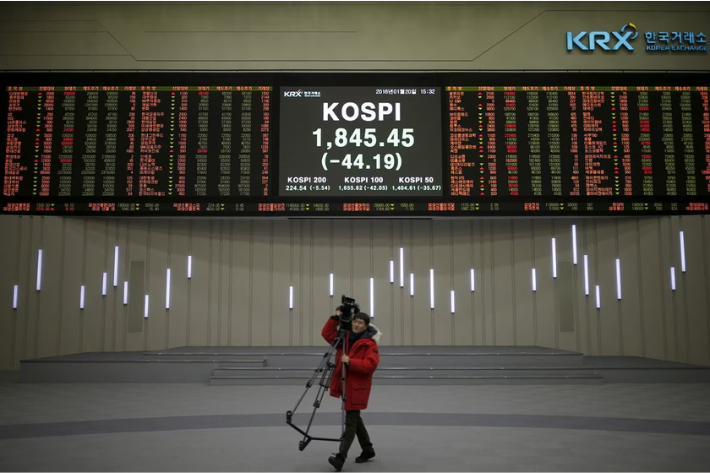Asia’s major stock indexes were on the back foot on Thursday as the odds lengthened on imminent and sharp interest rate drops anytime soon.
Investors were also discouraged by the gloomy global economic picture, despite some positive data out of China, and by the impact of the recent earthquake on Japan’s prospects.
Tokyo’s Nikkei share average fell as much as 2% on the first trading day of 2024, as airline, construction and utilities reacted to Tuesday’s aircraft collision and the powerful quake that hit western Japan earlier this week.
Chip-related stocks dragged the Nikkei the most, tracking overnight weakness of US technology stocks, while the main impact of the quake and collision was on shares in airline, nuclear power plant operators and construction sectors.
Also on AF: Smaller Profit Margins Help China’s BYD Steal Tesla’s EV Crown
The Nikkei trimmed its losses to end 0.53% lower, or 175.88 points, at 33,288.29, while the broader Topix was ahead 0.52%, or 12.40 points, to 2,378.79.
The earthquake that hit western Japan coast on New Year’s Day killed at least 81 people, with rescuers still searching for survivors.
Utility Hokuriku Electric, whose Shika nuclear power plant is located close to the earthquake epicentre, closed 2.2% lower after falling as much as 8%.
Chinese stocks fell, dragged by liquor companies, despite a private survey showing the country’s December services activity expanded at its quickest pace in five months.
However, the encouraging data alone failed to significantly lift market sentiment given the broad macro weakness in the property sector and consumer prices, UBS analysts observed in a note.
China’s blue-chip CSI 300 Index dropped 0.92%, while the Shanghai Composite Index lost 0.43%, or 12.90 points, to close at 2,954.35. The Shenzhen Composite Index on China’s second exchange dropped 0.84%, or 15.21 points, to 1,797.50.
Hong Kong-listed tech stocks did not follow an overnight rally in their US counterparts, falling 0.5%. Alibaba rose only 0.5%, compared to a 2.5% increase in its American depositary receipts traded in New York. Meanwhile, shares of Meituan and Tencent declined 1.8% and 0.2% respectively
The Hang Seng Index was flat, edging down 0.01%, or 0.43 points, to 16,645.98.
Elsewhere across the region, in earlier trade, there were also losses in Sydney, Seoul, Singapore, Taipei and Bangkok. Wellington, Manila, Mumbai and Jakarta rose.
MSCI’s broadest index of Asia-Pacific shares outside Japan fell 0.17% and was headed for a third straight day of losses in a sobering start to the year.
Spotlight on US Non-Farm Payrolls
In Europe, futures indicated a mixed opening for its markets. Eurostoxx 50 futures were down 0.04%, German DAX futures eased 0.07% and FTSE futures added 0.08%.
Minutes of the Fed’s December 12-13 meeting released on Wednesday showed a growing sense among policymakers that inflation was under control and raised concerns about the risks of “overly restrictive” monetary policy on the economy.
Markets are now pricing in a 70% chance of the Fed cutting rates in March compared to 90% a week earlier, according to the CME FedWatch tool.
The spotlight will now be on the eagerly awaited US non-farm payrolls report scheduled for Friday to provide further clues on the labour market, which has shown signs of easing.
US job openings dropped by 62,000 to 8.79 million for the third straight month in November, the Labor Department said in its monthly Job Openings and Labor Turnover Survey, or JOLTS report, on Wednesday.
Benchmark 10-year Treasury yields briefly climbed above 4% on Wednesday before heading lower and were last at 3.924%.
In the currency market, the dollar held on to its strong start to the year. Against a basket of currencies, the dollar was up 0.068% at 102.47, just shy of the three-week high of 102.73 it touched on Wednesday.
Against the yen, the dollar hovered near a two-week peak and last bought 143.76 yen, having jumped nearly 1% on Wednesday.
US crude rose 0.91% to $73.36 per barrel and Brent was at $78.78, up 0.68% on the day, extending their gains as disruption at Libya’s top oilfield added to fears that rising tensions in the Middle East could disrupt global oil supplies.
Spot gold added 0.1% to $2,043.09 an ounce, after touching its lowest since December 21 on Wednesday.
Key figures
Tokyo – Nikkei 225 < DOWN 0.53% at 33,288.29 (close)
Hong Kong – Hang Seng Index < DOWN 0.01% at 16,645.98 (close)
Shanghai – Composite < DOWN 0.43% at 2,954.35 (close)
London – FTSE 100 > UP 0.18% at 7,696.27 (0935 GMT)
New York – Dow < DOWN 0.76% at 37,430.19 (Monday close)
- Reuters with additional editing by Sean O’Meara
Read more:
China’s Services Sector Sees Best Growth in 5 Months: Caixin
China Stocks See Highest Foreign Outflows of 2023 in December
China Funds Told New A50 Index Best Reflects Economy
Hang Seng Follows Wall Street Tech Slump as Rate Hopes Fade























